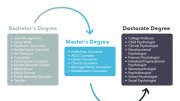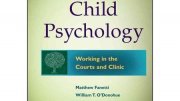 Criminal psychologists help law enforcement understand the criminal mind.
Criminal psychologists help law enforcement understand the criminal mind.
Criminal psychologists are experts in helping law enforcement officials determine motives, attitudes and techniques in criminals’ behavior. The field is very closely related to forensic psychology, which is the study of psychology as it relates to the law. The educational requirements for criminal psychologists are varied. There are certain basic requirements that must be met to be a licensed psychologist. However there is no specific specialized training requirements to specialize in criminal psychology. Experts do recommend a few options to prepare for the field though.
Bachelor's Degree
All psychologists, regardless of specialty, must begin their education by obtaining a bachelor’s degree. A major in psychology is a good way to start, but is not necessarily the only way. A minor in psychology will usually be enough to qualify for graduate school, which is the next step. Those interested in criminal psychology may want to either major or minor in psychology and then either major or minor in criminal justice, law, or police science. Internships and field training with law enforcement, mental hospitals, probation officers, and court systems are a plus as well. These are not necessarily requirements, but they will give the student a good basic preparation for their future career.
Master's Degree
A master’s degree is the next educational requirement for a future criminal psychologist. There are several universities that offer master’s degrees in forensic psychology. If this is not an option, majoring in clinical or counseling psychology is a good alternative. Some schools that do not offer a forensic psychology specialization do at least offer one or two courses in police, legal, or criminal psychology as part of their clinical and counseling degree programs. Obviously if these elective courses are available, they should be taken.
Doctoral Degree
In most states, practicing psychology requires a doctoral degree in psychology. There are schools that offer doctorates in psychology with a forensic specialty. However, like the master’s degree, if a forensic psychology specialty is not an option at the university the student wishes to attend, a doctorate in psychology with a clinical or counseling specialty will suffice. The American Board of Professional Psychology offers a certification in forensic psychology as well. Those who are eligible for this certification have completed the appropriate doctoral level education requirements and have proven themselves in the field.
Source: everydaylife.globalpost.com
You might also like:



|
(law, ethics) PSYCHOLOGICAL EVALUATIONS FOR THE COURTS, 3RD EDITION (Book + 5 CE Credits) the section entitled The Criminal Process in the book by G. Melton, J. Petrila, N. Poythress, C. Slobogin, ISBN 1572309660 (continuing education, psychology, social work) Single Detail Page Misc (Red Toad Road Company)
|
|
(law, ethics) Psychological Evaluations for the Courts, 3rd Edition (ISBN 1572309660) by G. Melton, J. Petrila, N. Poythress, C. Slobogin, the section entitled The Criminal Process in the book (5 CE Credits or 5 CME Credits only, book not included) Single Detail Page Misc (Red Toad Road company)
|














